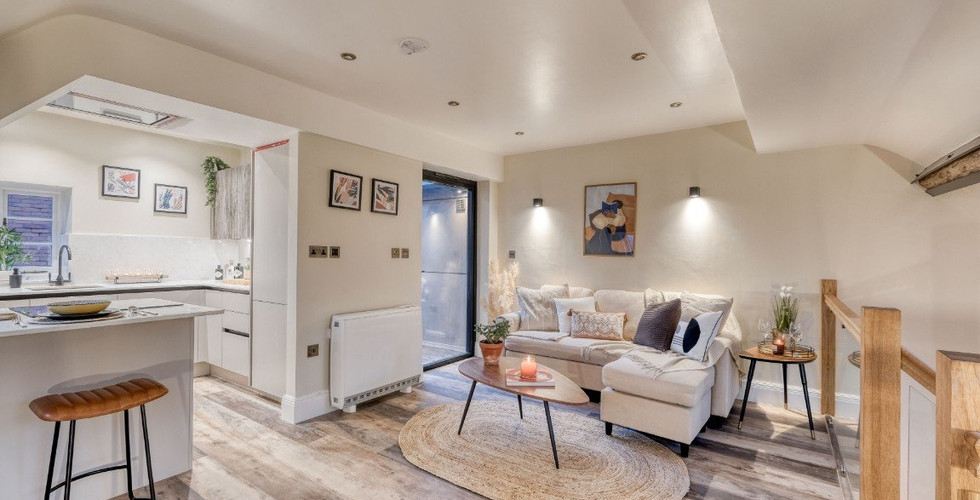How Long Will It Take to Stage My Property?
- apaneser
- Apr 2, 2024
- 4 min read
Selling a home can be an exciting yet daunting task, and one of the key factors in ensuring a successful sale is the presentation of your property. Professional home staging can make a significant difference in how potential buyers perceive your home. However, one common question that arises when considering home staging is, "How long will it take to stage my property?". The answer to this question depends on several factors, including the condition of the property, its size, the need for refurbishment or decorating, the availability of furniture, and the scheduling of the staging process.
In this article, we will delve into these factors to help you understand the timeframes involved in staging your property effectively.
Factor 1: Property Condition
The first and foremost consideration when determining how long it will take to stage your property is its current condition. Is your home move-in ready, or does it require refurbishment, decorating or a deep clean before staging can begin? The extent of the work needed will directly impact the staging timeline.
If your property is in excellent condition, with no major repairs or renovations necessary, we can move on to the staging process relatively quickly. However, if your home needs repairs, painting, or other maintenance work, you should factor in the time it takes to complete these tasks before staging can commence.
Repairs: If your property has structural issues or significant repairs to be done, it's essential to address these first. Depending on the scope of the repairs, this can take anywhere from a few days to several weeks.
Painting: A fresh coat of paint can do wonders to improve the overall look of a property. The time required for painting depends on the size of your home and the number of rooms that need attention. On average, painting a home can take one to two weeks. This is something we can help with as an additional service.
Decorating: If you plan to update or change the interior decor, such as flooring, lighting fixtures, or countertops, you'll need to account for the time it takes to select, purchase, and install these elements. This process can range from a few days to several weeks, depending on the complexity of the changes.
Factor 2: Property Size
The size of your property is another crucial factor that affects the staging timeline. Smaller homes typically require less time to stage than larger ones. The number of rooms and the complexity of the layout can significantly impact the staging process.
In a smaller home with fewer rooms, staging can typically be completed in a shorter time frame – a simple staging job can usually be carried out in 1-2 days. On the other hand, larger homes may require more time and effort to stage properly – a large 4-6 bedroom property can take 2-5 days to fully stage throughout. It's essential to work with a professional home stager who can efficiently manage the staging process based on your property's size. We’ve worked on all types of properties, from one-bedroom apartments to six-bedroom mansions.
Factor 3: Furniture Availability
Furniture plays a vital role in the home staging process. If you already have some suitable furniture that can be used for staging, it can help the process. However, if your property is completely empty or existing furniture is not suitable for staging, we’ll need to allocate furniture we have in stock and perhaps even order new furniture.
Existing Furniture: If your current furniture is in good condition and complements the desired style of your home, it can be used for staging. This can save time and reduce the need for furniture shopping.
Ordering New Furniture: If new furniture is required for staging, you’ll need to consider the time it takes for a home stager to select, order, and have it delivered. This process can take several weeks, so planning ahead with your home stager is crucial.
Factor 4: Scheduling and Planning
Effective planning and scheduling are key to ensuring that your property is staged in a timely manner. Here are some tips to help you stay on track:
Consult with a Professional Stager: Start by consulting with a professional home stager well in advance of your desired listing date. They can assess your property's needs and provide you with a realistic timeline, advising on any jobs that may need doing before staging commences.
Create a Staging Timeline: Work with your stager to create a detailed staging timeline that includes all necessary tasks, from repairs and painting to furniture delivery and setup.
Coordination with Other Professionals: If you're working with contractors, painters, or other professionals, ensure that their schedules align with your staging timeline to avoid delays.
Flexibility: Be prepared to adapt your staging timeline if unexpected issues arise during the process. Flexibility can help you navigate any challenges that may arise.
Conclusion
In conclusion, the time it takes to stage your property depends on various factors, including its current condition, size, the need for refurbishment or decorating, furniture availability, and effective scheduling. To ensure a successful and timely staging process, it's essential to plan ahead, work with professionals, and address any property issues promptly.
Remember that a well-staged property can make a significant difference in attracting potential buyers and securing a favourable sale. By considering these factors and taking a proactive approach to the staging process, you can maximise the appeal of your home and increase your chances of a successful sale.
If you'd like a free consultation to discuss your property's home staging needs, we'd love to hear from you, so please get in touch!














Comments